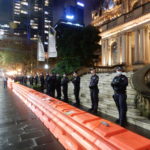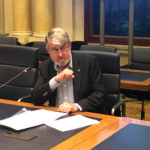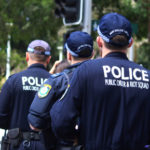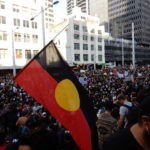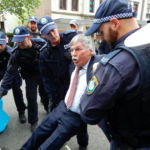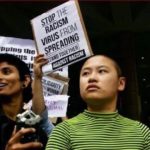Should Protests Be Banned During COVID-19?

It’s been a week of clashes in Victoria over new public health regulations, starting with Eve Black flouting rules at the border checkpoint last weekend, by refusing to tell Police her reason for travelling.
Aside from copping a serious amount of public flack on social media, after posting a video showing her interaction with police, police also say they will track her down, and if she is found to be in breach of the law, then she will be fined.
Another video showed a dispute between Victoria Police and a woman who claimed that coronavirus laws did not apply to her, shows her saying that the police’s attempts to take her into custody for not wearing a mask amounted to “armed kidnapping”.
How good is the footy?
Many have criticised the fact that Police Forces as well as Federal and State governments have been so vehemently against members of the public gathering to protest against abuses by police officers and government policies, when gatherings seem to be tolerated or even promoted in other situations – including when it comes to sporting events.
They point out that protesting is fundamental to a healthy, functioning democracy and can, perhaps, be seen as more important than going to the footie.
But police have been out in force during recent protests, liberally issuing infringement notices – including when people stay inside their cars – and even employing heavy-handed tactics when dealing with people who are pushing for change.
Yet people sit on furniture in places like Ikea and move through indoor settings like Bunnings and supermarkets in herds, or chug beers and yell at the footie with others beside, behind and in front of them, without police intervention.
But what is the law when it comes to failing to comply with a declared public health order?
Travel bans
In the case of crossing the border without a permit, you can be penalised with a fine of up to $11,000 or jailed for up to six months, or both. Extra fines for each day you are in NSW, or for any other breaches of public health rules, say for example, not adhering to self-isolation upon entry, may also apply.
Face masks
Currently, in Victoria, it is mandatory to wear a mask outside the home around metropolitan Melbourne and Mitchell Shire, and failing to do so means that Police can issue you with a $200 fine.
Of the 152 public health breach fines issued in Victoria over the past couple of days, 23 of those were for failing to wear a face covering when leaving home.
Certainly, while the health threat posed by Covid-19 remains a serious concern in Victoria as well as in some ‘hot spots’ in New South Wales, new regulations such as these are being put into place and others are changing at a fairly rapid pace as health authorities respond to the virus.
In many cases, this adds to confusion about exactly where the law lies.
Furthermore, these public health policies are determined on a state and territory basis which also adds to the perplexity.
Of course, there are also concerns that these public health laws can be enshrined without any of usual parliamentary debate that goes into making other laws, but they are allowed to, in times of public emergency.
And while both the New South Wales and Victorian Police forces say they’re aiming to be ‘fair’ they have received a fair amount of criticism for heavy-handed policing over the past several months, and often, inconsistency in policing of these regulations. There have been calls from all sections of the community for more public education and a more cooperative-style of policing as opposed to simply handing out hefty fines.
In fact, in both New South Wales and Victoria ‘more policing’ has been a major tactical response from both of the state governments in slowing the spread of the coronavirus, a strategy that has been widely criticised.
While NSW has beefed up officer numbers and given police more powers, the Victorian Government extended the areas of responsibility and powers of Protective Services Officers (PSOs).
What about basic freedoms?
But anyone who thinks they can disobey a public health directive issued by Police and cite their basic freedoms, needs to think again.
International human rights law, notably the International Covenant on Civil and Political Rights (ICCPR), requires that restrictions – such as quarantines, lockdowns, and travel bans – comply with rights norms, and in the case of public health or national emergency be lawful, necessary, and proportionate.
At the same time, International human rights law also guarantees everyone the right to the highest attainable standard of health and in fact obligates governments to take steps to “prevent threats to public health and to provide medical care to those who need it.”
Human rights law also recognises that in the context of serious public health threats and public emergencies threatening the life of the nation, restrictions on some rights can be justified when they have a legal basis, are strictly necessary, based on scientific evidence and neither arbitrary nor discriminatory in application, of limited duration, respectful of human dignity, subject to review, and proportionate to achieve the objective.
Which brings us back to our state-based public health regulations.
It’s also important to note that businesses are entitled to act in accordance with public health law and refuse entry to anyone who, for example, is not wearing a face mask, without that person decreeing that their human right not to be discriminated against has been breached.
Technically, you could be booted out of a store, cafe or bar for not adhering to the 1.5 metre socially distancing rule.
The Public Health Act NSW
The Public Health Act 2010 (NSW) (‘the Act’) empowers state officials to make public health orders with a view to dealing with health risks.
The power to deal with these risks is contained in section 7 of the Act, which provides that where the health minister considers on reasonable grounds that a situation has arisen that is, or is likely to be, a risk to public health, the minister may take such action or give such directions that are necessary to deal with the risk and its possible consequences.
The section makes clear that actions and orders can be made in order to:
- Reduce or remove any risk
- Segregate or isolate inhabitants
- Prevent, or conditionally permit, access to areas
The section says that such an order must be published in the Gazette as soon as practicable after it is made, but that failure to do so does not invalidate the order.
Similar legislation applies in other parts of the nation.
The offence of failing to comply with a public health order
Section 10 of the Public Health Act provides that a person who, without reasonable excuse, fails to comply with such a direction faces a maximum penalty of 6 months in prison and/or a fine of 100 penalty units, which is currently $11,000.
Any continued failure to comply is punishable by a fine of 50 penalty units, or $5,500, for each day the offence continues.
The maximum penalty for companies is 500 penalty units, or $55,000, and 250 penalty units, or $27,500 for each day the offence continues.
Police are also empowered to issue criminal infringement notices of $1000 to individuals and $5000 to businesses. Receiving these ‘on-the-spot’ fines does not result in a criminal record, and the recipient can elect to take the matter to court.



